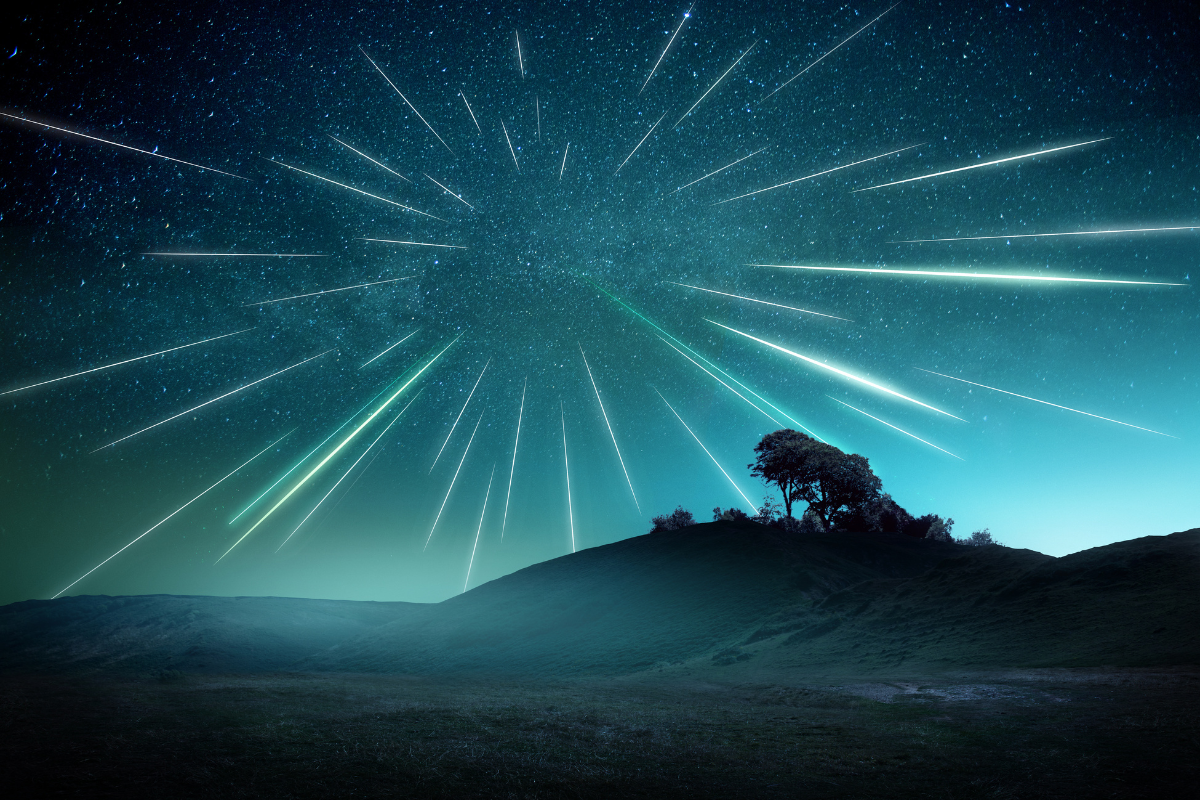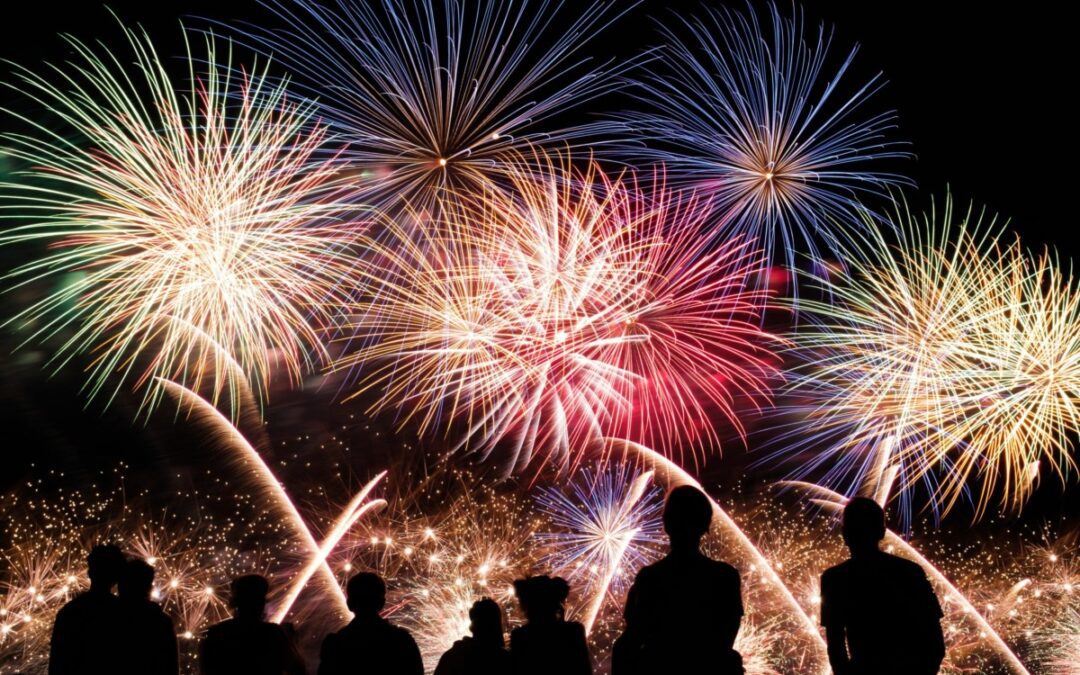
Photo courtesy of Canva
Make sure to spend some solid time stargazing on these dates.
If you’re unfamiliar with the term “celestial event,” let us enlighten you.
At its simplest, a celestial event refers to anything that happens in space that is also visible to the naked eye. Some examples include:
- Phases of the moon
- Eclipses
- Solstices
- Meteor showers
- Elongation of planets
From January 2024 until the beginning of spring, ‘Ganders will experience eight such events, from a Quadrantid meteor shower to the March equinox. Here’s a bit of information about each one—plus how to find them and even where to go to get the best view.
January 3-4: Quadrantid Meteor Shower
The Quadrantid meteor shower is an annual celestial event that occurs when our planet passes through ice, dust, and debris from an asteroid known as 2003 EH1, which scientists believe is an extinct comet.
Unlike most meteor showers, which last for days, this one only lasts a matter of hours. So although it technically runs from mid-November through mid-January, you’ll most likely only catch it during its predicted peak, which is a narrow window of only six or so hours.
Fortunately for Michiganders, the peak is set for around 4 a.m. Eastern Time on Jan. 4, which means there’s a good chance you’ll see some shooting stars—if you want to bundle up and head outside in the wee hours of the morning, that is. If not, you can probably still catch the event once the sun sets on Wednesday, Jan. 3.
Another pro of the 2024 Quadrantid meteor shower compared to past years is that the moon will be a 47% illuminated waning crescent in the constellation Virgo during the peak, allowing for far better viewing.
Here’s how to find it: First, head to the darkest location possible and give your eyes half an hour or more to adjust to the darkness. When you’re ready, look toward the north to find the Big Dipper, then follow the arc of the handle to Arcturus. Keep your gaze in this region to see the brightest Quadrantids streak the night sky, as they will be visible to the naked eye—no telescope or fancy equipment needed.
So set your alarms and get ready for some dead-of-night stargazing—and don’t forget the obligatory thermos of hot chocolate.
January 11: New Moon
New moons occur when the moon is situated between the Earth and the sun, making it so the illuminated side of the moon isn’t visible to us. As a result, the moon blends in with the rest of the dark night sky.
In Lansing, the New Moon will occur at precisely 6:58 a.m. on Jan. 11, but the moon on the night prior will only be a 0.9% waning crescent, so you most likely won’t be able to see it then, either. Without the light reflecting off the moon, however, the stars will be extra bright that night—only if the clouds decide to dissipate, of course.
If it happens to be a clear night and you want to get your stargazing on, consider heading to one of Michigan’s nine Dark Sky Preserves, three of which are internationally recognized.
January 12: Mercury at Greatest Western Elongation
On Jan. 12, Mercury will reach its greatest western elongation—the maximum angle between the sun and a planet—of 23.5 degrees. According to Sea and Sky, the best time to see Mercury will be on this day just before sunrise, as it will be at its highest point above the horizon.
To find it, look toward the east and find Venus, which is easier to spot because it’s higher on the horizon and brighter. Then, the Saint Louis Science Center suggests stretching out your arm and closing one eye. Your fist should cover about 10 degrees of sky—roughly the same distance between Venus and Mercury. Once you spot Venus, you should be able to use this trick to find Mercury below it.
January 25: Wolf Moon
Full moons occur when the moon is on the opposite side of Earth as the sun, making the sphere fully illuminated. This particular full moon, which will be at its peak at 12:54 p.m. on Jan. 25 in the state’s capital, was known to early Indigenous Americans as the Wolf Moon because it happened during the time of year when packs of wolves gathered near their camps and howled.
According to the Farmer’s Almanac, alternative names for this moon include:
- Center Moon (used by the Assiniboine people)
- Freeze Up Moon (used by the Algonquin people)
- Hard Moon (used by the Dakota people)
- Frost Exploding Moon (used by the Cree people)
- Canada Goose Moon (used by the Tlingit people)
- Greetings Moon (used by the Western Abenaki people)
- Spirit Moon (used by the Ojibwe people)
February 9: New Moon
February’s new moon will happen at exactly 6 p.m. on Feb. 9 in Michigan. At that time, the moon will be 0% illuminated and effectively disappear from the evening sky.
Weather permitting, this should be another excellent opportunity to stargaze. Some of the constellations to look out for include:
- Orion
- Auriga
- Camelopardalis
- Gemini
- Monoceros
February 24: Snow Moon
The second full moon of 2024 will occur at 7:31 a.m. on Feb. 24 in Michigan. However, it will be below the horizon at this time of day, so it’s best to look for it after the sun sets on Feb. 23 or 24.
Early Native American tribes called this the Snow Moon, as it came around when the heaviest snowfalls blanketed the earth in the Northern Hemisphere. Because the snow often made hunting difficult, leading to food scarcity, other tribes such as the Cherokee people called this celestial event the Hunger Moon. Other names include:
- Storm Moon
- Bald Eagle Moon (used by the Cree people)
- Bear Moon (used by the Ojibwe people)
- Black Bear Moon (used by the Tlingit people)
- Raccoon Moon (used by the Dakota)
- Groundhog Moon (used by some Algonquin people)
- Goose Moon (used by the Haida)
This year, the Snow Moon is also a “micromoon” (or “apogee”) meaning the moon is at its farthest point from the Earth. You’re probably more familiar with the opposing term, “supermoon,” which happens when the moon is at its closest point to Earth. According to the Farmer’s Almanac, this full moon will be approximately 252,225 miles from Earth.
March 10: New Moon
March 10 marks the third new moon of the year. In the state capital, the peak will happen at 5:02 a.m. that day.
According to LUNAF’s lunar calendar, there will be a high ocean tide on that date due to the strong, combined force of the sun and moon’s gravitational pull and the sun-moon-Earth syzygy alignment.
March 20: March Equinox
An equinox is a celestial event that occurs when a plant’s subsolar point passes through its equator. Here on Earth, there are only two equinoxes every year, and the first one of 2024 will happen on March 20. In the Northern Hemisphere, it’s referred to as the vernal equinox, spring equinox, or simply the March equinox, while in the Southern Hemisphere, it’s the opposite (aka the autumnal equinox).
In Michigan, the sun’s rays will shine directly above the equator at around 11:06 p.m. Around this time, night and day are about the same length around the world, which is how this celestial event earned its name—“equinox” means “equal night” in Latin. After the March equinox, many places will have more daylight than darkness.
In terms of astronomy, this event also marks the official start of spring for those of us in the Northern Hemisphere. The end of Michigan’s cold and dreary winters deserves a celebration, so why not take a cue from cultures around the world and plan a festive gathering with friends and family?

We discovered the perfect family beach resort just 2 hours from Detroit
A gorgeous, activity-packed, and family-friendly beach resort that’s just a two-hour flight from Detroit? Sign us up. There comes a time in every...

Airborne adventure awaits on the 8 best ziplines in Michigan
Buckle your helmet and explore eight family-friendly ziplining locations in Michigan that will have you zooming through the treetops in no time. ...

11 fantastic Fourth of July fireworks shows in Michigan
Head to one of these impressive Fourth of July fireworks shows across Michigan for some festive fun. Not everyone enjoys a large and loud fireworks...

5 adult summer camps in Michigan that will leave you wanting s’more
Load your trunk with bug spray, head to the arts and crafts cabin, and relive your childhood glory days at these adult summer camps in Michigan. ...

14 things in Michigan to do over Memorial Day weekend
From parades to car shows and festivals all across the state, here are some Memorial Day weekend events to check out in Michigan. Memorial Day...







